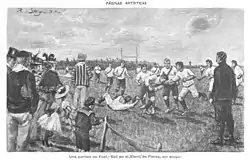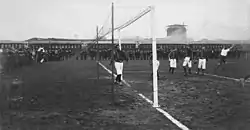| Location | Caballito, Buenos Aires |
|---|---|
| Owner | Flores A.C. |
| Type | Stadium |
| Genre(s) | Sporting events |
| Surface | Grass |
| Construction | |
| Built | c. 1892 |
| Closed | c. 1907 |
The Flores Old Ground (also known as "Old Polo Ground" or "Old Polo Field"[1] or "Flores Polo Ground"[2]) was the stadium of defunct Flores Athletic Club. Located in the barrio of Caballito, Buenos Aires,[3] just behind the Buenos Aires Western Railway freight sheds,[4] it hosted several polo, rugby union, association football and cricket matches during the period Flores A.C. was active.[5]
History

By 1860 a big British community lived in the "porteños" neighborhoods of Caballito and Flores, with most of their members working in commerce activities. They usually spent summertime in their country houses located in Barracas, Belgrano and Flores, which was the favorite place of Argentine high society families to spend their free time. Some of the biggest palaces (such as "Miraflores", built in 1886 and currently a school, or "Las Lilas") had been erected in that zone.[6][7][5]
"It is believed that the Flores Old Ground was located close to current Club Ferro Carril Oeste headquarters, between Avellaneda streets and the Sarmiento Railway tracks"
Flores A.C. was established in the same lot where in 1875 the first polo match had been played in Argentina.[8][9] The stadium was a multi-purposed venue, being used by the polo, rugby union and football teams from the club during the last years of the 19th century.[10] The Old Ground was a recurrent venue not only for the Flores A.C. team (which played in Primera División from 1893 to 1897) but for other football teams such as Buenos Aires F.C.[note 1] in 1891.[11] Moreover, the first final match of Argentine football (between St. Andrew's and Old Caledonians) was held in the Old Ground.[4]

The Old Ground was also used as home venue by the rugby union (as the club was one of the founding members of Argentine Rugby Union) and polo teams from the institution.
In fact, the first registered rugby union match played by Flores A.C. was on July 19, 1896, against Buenos Aires FC[12] at Flores Ground. The stadium was also used by the Buenos Aires FC to play Rosario Athletic Club.
In 1900, the Old Ground hosted the Tie Cup final match when Belgrano A.C. beat Rosario A.C. by 2–0. The stadium would be used for another final game in 1904 when Rosario A.C. defeated Uruguayan team CURCC by 3–2.[13]
In 1907 Flores Athletic sold some of its facilities to Club Ferro Carril Oeste, for m$n 700. The agreement included two fields, but it is unclear if the Old Ground was part of the transaction.[7]
See also
Notes
- ↑ This was not the BAFC founded by the Hogg brothers but another football team that only participated in the 1891 championship. The squad (whose jersey was red and white in vertical stripes)[3] played regularly at Flores Old Ground during that season.[11]
References
- ↑ The Standard, British language newspaper edited in Buenos Aires, 1892
- ↑ Historia cronológica de la ciudad de Buenos Aires 1536-2014 by Leonel Contreras, Editorial Dunken, Buenos Aires, 2014 - ISBN 978-987-02-7306-6
- 1 2 Historia del Fútbol Amateur en la Argentina, by Jorge Iwanczuk. Published by Autores Editores (1992) – ISBN 9504343848
- 1 2 El día que los ferroviarios se llevaron las medallas, Página/12, 18 Oct 2010
- 1 2 3 Historia del Flores Athletic Club, 12 Jun 2013
- ↑ Orígenes de los deportes británicos en el Río de La Plata, Eduardo Olivera, Buenos Aires, 1932
- 1 2 "Una investigación sobre la Historia del Flores Athletic Club" by Rubén Ayala, C.E.H.R., Buenos Aires (1997)
- 1 2 El polo en la Argentina. Primera parte: Las prácticas iniciales en el país, Ernesto Ceballos, Buenos Aires (1969)
- ↑ 100 años de polo en la Argentina 1888–1988, Elsa Boglione, Buenos Aires, 1988
- ↑ "Historial del Abierto Argentino de Polo", official website
- 1 2 Argentina 1891 by Osvaldo Gorgazzi at RSSSF.com
- ↑ "Historia del Club" Archived 2014-09-13 at the Wayback Machine on BACRC official site
- ↑ 1900 Tie Cup Competition final by Osvaldo José Gorgazzi on RSSSF